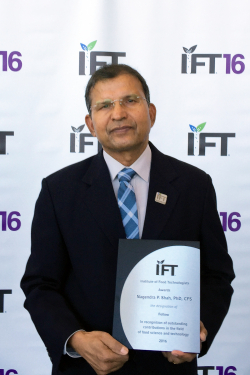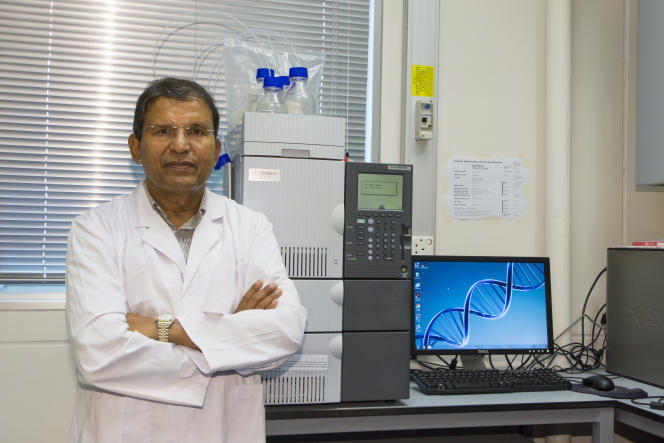Media
HKU biological scientist Professor Nagendra Shah receives prestigious award from the International Dairy Foods Association (USA)
24 Jul 2016
Professor Nagendra Shah, Professor of Food Science and Technology in the School of Biological Sciences, University of Hong Kong (HKU) was named the recipient for the International Dairy Foods Association Research Award in Dairy Foods Processing in 2016 by the American Dairy Science Association. He received the award in an award presentation ceremony held on July 21 (Thursday) in Salt Lake City, Utah.
The American Dairy Science Association (ADSA) is an international organization of educators, scientists, and industry representatives who are committed to advancing the dairy industry and keenly aware of the vital role the dairy sciences play in fulfilling the economic, nutritive, and health requirements of the world's population. The purpose of the International Dairy Foods Association Research Award in Dairy Foods Processing is to recognize individuals whose research findings have allowed dairy foods processors to develop new products, to make a significant improvement in the quality, safety, or processing efficiency of dairy foods. A renowned academic is chosen each year for the award from among the nominees all over the world.
Professor Shah has made outstanding contributions to the Australian and international dairy industries over the past 35 years. His contribution in the arena of dairy foods processing research has been recognized internationally through various awards, of which some notable ones include the 2013 American Dairy Science Association Distinguished Service Award, the 2011 Australian Institute of Food Science and Technology Keith Farrer award of Merit, the 2009 California Dairy Research Foundation William C. Haines Dairy Science award, and the 2003 Marschall Rhodia International Dairy Science Award. He is a Fellow of the Australian Institute of Food Science and Technology, American Dairy Science Association, and Institute of Food Technologists. He is also listed in the “top 1% list of scholars” by the ISI Web of Knowledge Essential Sciences Indicator (ESI).
Professor Shah has pursued active research in dairy foods processing and published widely on physiology, bioactivities and health properties of probiotics and their genomic and bio-informatic analysis, EPS producing starter cultures and texture and microstructure of low fat yogurt and mozzarella cheese. His team has also developed rapid and reliable techniques to detect and quantify pathogens in milk powder.
A pioneering work by Professor Shah leading to his award has been on γ-aminobutyric acid (GABA) producing lactic acid bacteria. GABA is a non-protein amino acid that has shown anti-hypertensive (blood pressure lowering) effect as an important function. Most high GABA producers are bacteria of plant origin, which are not able to grow in milk. Professor Shah’s research team has shown that with the help of bacteria native to milk, bacteria of plant origin could synthesize GABA in milk. This groundbreaking work has great commercial significance in developing dairy foods with GABA for anti-hypertensive activity (i.e., for lowering blood pressure).
Another important work of Professor Shah’s team is galactose metabolism in dairy foods. Bacteria that are used to make dairy foods are able to breakdown milk sugar, i.e. lactose, into glucose and galactose. Glucose is easily utilized by these bacteria. These bacteria, however, do not breakdown galactose, accumulation of which can lead to serious problems in dairy foods (such as textural defects in Cheddar cheese and browning of pizza made using Mozzarella cheese containing lactose or galactose) and galactosemia (an inherited disease in which the transformation of galactose to glucose is blocked) in humans. The team has pioneered in discovering bacterial pathways and their gene expression to understand why this happens which provides hints to what can be done to alleviate issues of galactose accumulation.
Another important area of Professor Shah’s work has been the genomic analysis of a high EPS producing bacteria. Bacteria produce a slime-like substance called exo-polysaccharides (EPS) and are commonly used for making yogurt and other dairy foods. Genomic analysis of an EPS producing S. thermophilus has shown that this organism produces two types of EPSs – capsular and ropy EPS, and revealed many other characteristics of this organism which were unknown till date. EPS can be used to improve texture and overall quality of low fat yogurt and Mozzarella cheese, especially since EPS is naturally produced by lactic acid bacteria.
Professor Shah received his BSc from India, MSc in Dairy Science from South Dakota State University and PhD in Food Science and Technology from University of Alberta. He is currently the disciplinary leader in the HKU School of Biological Sciences. Prior to joining HKU in 2012, he had worked at Victoria University Australia for 21 years at various capacities.
Professor Shah has authored and co-authored 302 papers and book chapters and 198 conference abstracts. He has edited three books (Probiotic and Prebiotic Foods: Technology, Stability and Benefits to Human Health, and Dairy Products and Quality Control (2 editions) and many other journal papers. He is one of the highly cited researchers 2015 (http://highlycited.com) listed by Thomson Reuters Essential Sciences Indicators (ESI) and one of the 9 highly cited researchers of the University of Hong Kong (http://www.hku.hk/press/news_detail_13320.html). He is also listed by the Thomson Reuters as one of the 2015 World’s Most Influential Scientific Minds!
For press enquiry, please contact Ms Cindy Chan, Senior Communication Manager of Faculty of Science, at 3917 5286 / 6703 0212 or by email at cindycst@hku.hk, or Ms Melanie Wan, Senior Manager (Media), Tel: 2859 2600/Email: melwkwan@hku.hk, Communications & Public Affairs Office, HKU.


